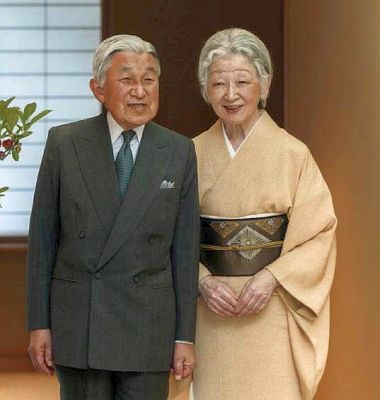Foreign Affairs
Related: About this forumJapan's Emperor Akihito Steps Down
Japanese Emperor Akihito, 85, is ending his three-decade reign on April 30, voluntarily stepping down due to health concerns. It is the country’s first abdication of the Chrysanthemum Throne since 1817.
His 31-year imperial era—known as Heisei, which can be translated as “achieving peace”—comes to an end with a ceremony at the Imperial Palace in Tokyo. A day after the abdication, his son, Crown Prince Naruhito, 59, ascends the throne in ceremonies at the same location.
Akihito helped to modernize the world’s oldest hereditary monarchy by bringing the imperial family closer to the public. He and his wife, Empress Michiko, have taken on gentle public personas and were seen as helping the nation through catastrophic natural disasters with displays of compassion that included visits to evacuation centers to speak to survivors.
His landmark apologies for the wartime aggression launched in the name of his father, Hirohito, helped ease often fraught relations with neighbors China and South Korea, which bore heavy blows from Japan’s militarism. Akihito spoke in ordinary Japanese, rather than the formal grammar employed by his father, the last emperor regarded by prevailing custom to be a living deity.
Akihito is an emperor of firsts. He was the first emperor to reign entirely under the U.S.-drafted pacifist constitution after World War II, the first to marry a commoner and, along with his wife, the first to raise his children at home.
https://www.bloomberg.com/news/features/2019-04-26/japan-emperor-abdication-akihito-s-life-in-pictures?srnd=politics-vp

soryang
(3,308 posts)It looks like "ordered harmony" to me. I'm really curious who came up the new name for the reign and what it really means to them.
left-of-center2012
(34,195 posts)Heisei period, in Japan, an imperial reign period that began in 1989 when Akihito became emperor on the death of his father, Hirohito (the Shōwa emperor).
The two Chinese characters (kanji) constituting the period’s name are translated, respectively, as “peace” and as the root of the verb “to become.”
An English equivalent for Heisei is “Achieving Peace.”
https://www.britannica.com/event/Heisei-period
soryang
(3,308 posts)where it says this:
"Yoshihide Suga, Japan’s chief cabinet secretary, unveils the name of the next imperial era—“Reiwa”—at the prime minister’s official residence a month before the ascension of Naruhito."
So I'm thinking these characters will have significance for the implied direction of the new era.
soryang
(3,308 posts)What's in a name? Japan puzzles over 'Reiwa', the term for new imperial era
Malcolm Foster
4 MIN READ
The first character, “rei,” is often used to mean “command” or “order,” imparting an authoritarian nuance that offends some. Prime Minister Shinzo Abe and his government prefer “good” or “beautiful”, a less widely known sense.
The second character, “wa,” is defined as “peace” or “harmony”, and together they mean “beautiful harmony,” Japan’s consulate in New York said in a bid to dispel confusion.
“It does not mean ‘order and harmony’ as has been reported in the press,” the consulate said in a statement.
The name is chosen by the cabinet, rather than the emperor, from a short list proposed by scholars.
While many Japanese were positive about the new name, to some, particularly young people, it sounded harsh.
“Do they mean ‘Give in to orders?’ They probably want another militarist era,” said one Twitter user.
https://www.reuters.com/article/us-japan-emperor-calendar/whats-in-a-name-japan-puzzles-over-reiwa-the-term-for-new-imperial-era-idUSKCN1RE0KW
The article says the "cabinet" came up with the name. I guess that means Abe.
soryang
(3,308 posts)“Based on the opinions from the experts and Cabinet members, I want Reiwa, which is derived from ‘Manyoshu,’ a Japanese literature classic, to be the new era name,” Abe said.
The government is set to compile detailed minutes from the series of meetings that will include the five candidates other than Reiwa and identify the speakers, but the records will be kept secret for 30 years in principal. It does not plan to reveal the proposers of Reiwa and other candidates even when the minutes are released.
https://www.japantimes.co.jp/news/2019/04/20/national/politics-diplomacy/reiwa-topped-japans-new-era-name-candidates-final-push-abe/#.XMdS17dKi00
nitpicker
(7,153 posts)(snip)
In the first private ceremonies of the day, the emperor reported his abdication to the mythological ancestors of Japan's imperial family.
The Taiirei-Seiden-nogi, or main Ceremony of the Abdication of His Majesty the Emperor, is expected to take place at the Matsu-no-Ma state room in the Imperial Palace. It begins at 17:00 local time (08:00 GMT) with Emperor Akihito and Empress Michiko entering the room and will last about 10 minutes. Over 330 attendants will also be present. The ceremony will end with Akihito delivering his final address as emperor, though he will technically remain emperor until midnight.
Tuesday's events will be the first time anyone alive will get to watch a Japanese abdication ceremony.
On Wednesday morning, Crown Prince Naruhito will inherit the Imperial Treasures in his first ritual as emperor.
(snip)